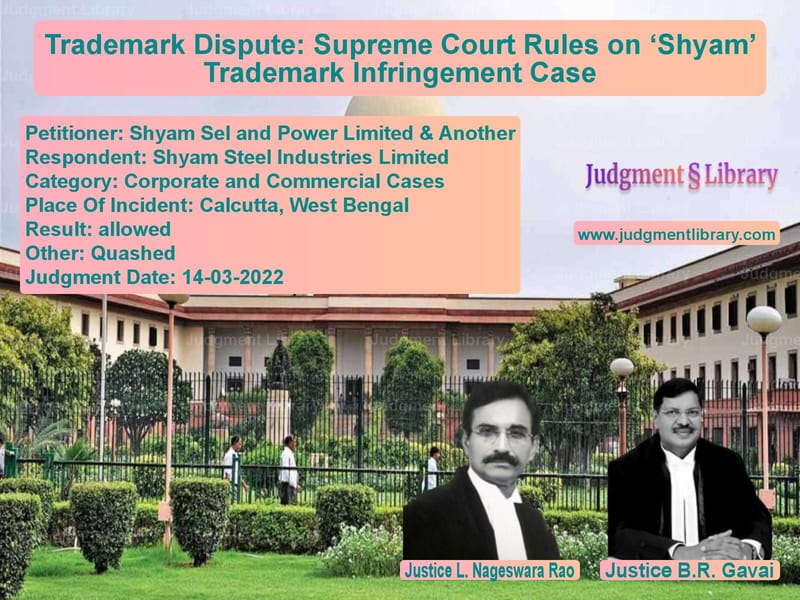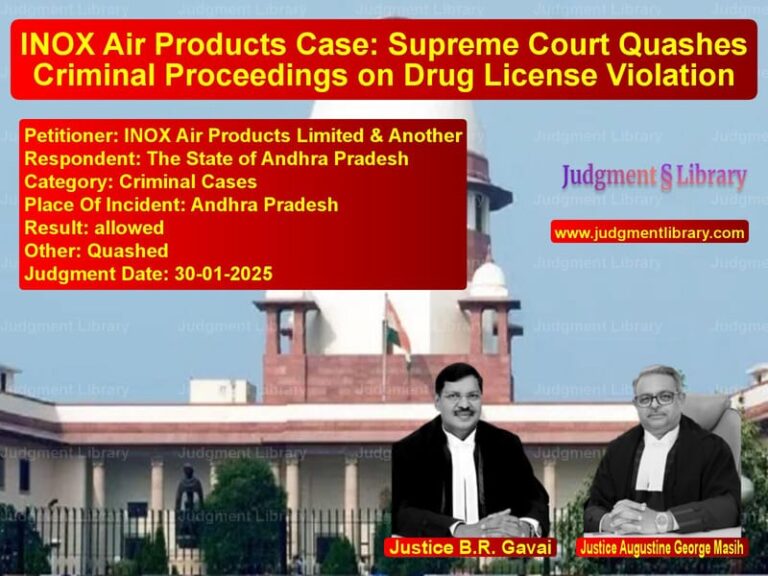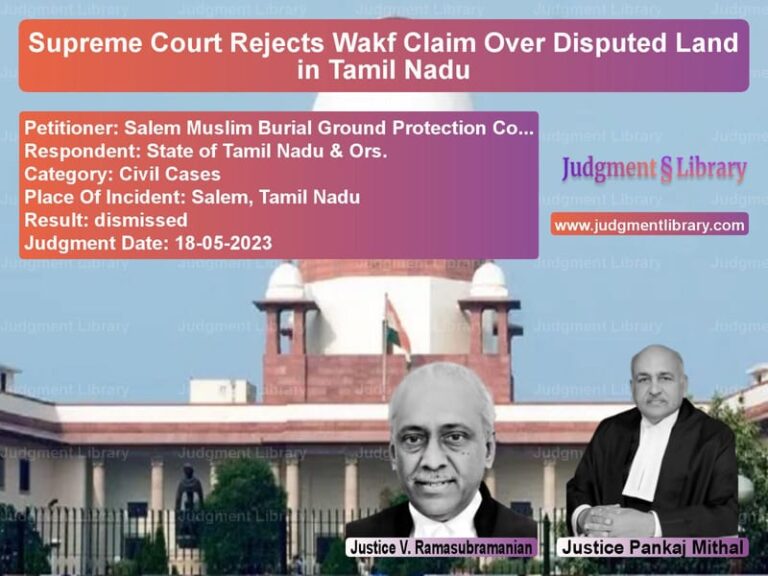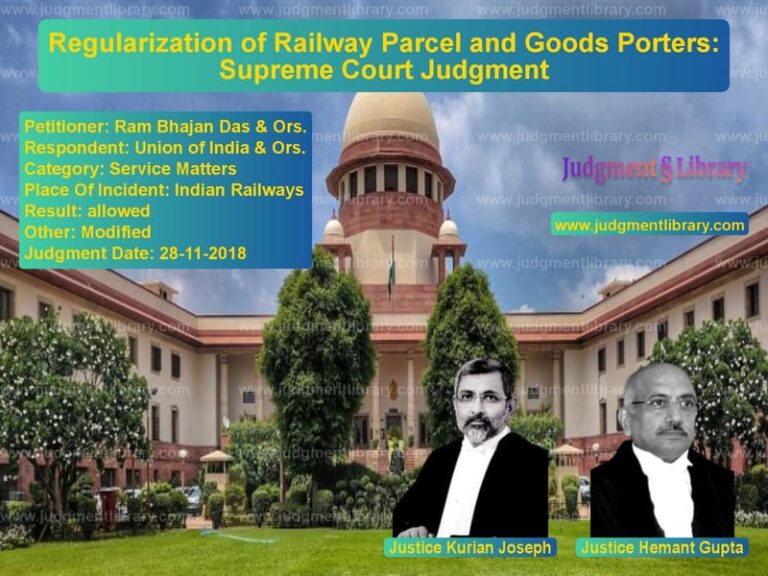Trademark Dispute: Supreme Court Rules on ‘Shyam’ Trademark Infringement Case
The case of Shyam Sel and Power Limited & Another vs. Shyam Steel Industries Limited involves a trademark dispute over the use of the word ‘Shyam’ in the branding of Thermo-Mechanically Treated (TMT) bars. The dispute reached the Supreme Court after conflicting orders from the Calcutta High Court regarding an injunction on the use of the trademark.
The Supreme Court examined whether the High Court’s Division Bench was justified in modifying the Single Judge’s order and whether the appeal itself was maintainable.
Background of the Case
The respondent, Shyam Steel Industries Limited, is a manufacturer of TMT bars and holds a registered trademark for the word ‘Shyam.’ The company claimed that the appellants, Shyam Sel and Power Limited, were infringing upon their trademark by using ‘Shyam Metalics’ on their products.
According to the respondent, the appellants initially agreed in 2015 to stop using the word ‘Shyam’ but later resumed its use in 2018. This led to a lawsuit being filed by Shyam Steel Industries before the Calcutta High Court, alleging trademark infringement and passing off.
The Single Judge of the High Court, in an order dated April 2, 2019, refused to grant an interim injunction but directed the appellants to maintain weekly accounts of their sales under the disputed mark.
The respondent then appealed this decision before the Division Bench of the High Court, which, on December 24, 2019, modified the Single Judge’s order and restrained the appellants from using the word ‘Shyam’ on their packaging.
The appellants, dissatisfied with the Division Bench’s order, approached the Supreme Court.
Arguments of the Petitioner (Shyam Sel and Power Limited)
The petitioners contended:
- The Division Bench of the High Court overstepped its jurisdiction by modifying the Single Judge’s order.
- The appeal before the Division Bench was not maintainable under Clause 15 of the Letters Patent as the Single Judge’s order was not a final judgment.
- The respondent-plaintiff had not shown any strong evidence of passing off, and the Single Judge’s decision was based on sound judicial discretion.
- The term ‘Shyam’ was part of their business name, and the Division Bench’s order caused undue hardship.
Arguments of the Respondent (Shyam Steel Industries Limited)
The respondent countered:
- Their trademark ‘Shyam’ was registered, and the appellants’ use of the name caused confusion in the market.
- The Single Judge failed to protect their rights by not granting an injunction.
- Since the appellants had previously agreed to phase out their use of ‘Shyam,’ their continued usage amounted to bad faith.
- The Division Bench was justified in granting relief as the appellants’ actions were affecting their brand identity.
Supreme Court’s Observations
The Supreme Court, comprising Justices L. Nageswara Rao and B.R. Gavai, analyzed the maintainability of the appeal before the Division Bench and the correctness of its order.
The Court made the following key observations:
- Maintainability of the appeal: The Court noted that under Clause 15 of the Letters Patent, an appeal lies only against a judgment. Since the Single Judge had merely postponed the injunction decision and allowed the appellants time to file an affidavit, it did not amount to a judgment.
- Interference by the Division Bench: The Supreme Court found that the Division Bench overstepped its jurisdiction by modifying the Single Judge’s order instead of directing a speedy hearing of the injunction application.
- Discretion of the Single Judge: The Court emphasized that appellate courts should not interfere with the discretionary orders of the Single Judge unless they are arbitrary or perverse.
- Trademark law principles: While acknowledging the respondent’s registered trademark, the Court stressed that a detailed hearing was required before passing any final orders.
Supreme Court’s Verdict
On March 14, 2022, the Supreme Court ruled:
- The appeal before the Division Bench was not maintainable as the Single Judge’s order was not a final judgment.
- The Division Bench’s order was quashed, and the Single Judge’s order was restored.
- The Single Judge was directed to decide the injunction application on merit within six weeks.
- A cost of Rs. 5 lakhs was imposed on the respondent for filing an unwarranted appeal.
The Court concluded:
“We are of the considered view that the order dated 2nd April 2019 cannot be construed to be a ‘judgment’ within the meaning of Clause 15 of Letters Patent and as such, the appeal to the Division Bench of the High Court was not tenable.”
Conclusion
This ruling establishes key principles in trademark law and procedural jurisprudence:
- Scope of appellate review: The Division Bench cannot interfere with interlocutory orders unless there is clear perversity.
- Trademark rights vs. business identity: The case highlights the complexities of trademark disputes where multiple businesses use similar names.
- Judicial efficiency: Courts must ensure that unnecessary appeals do not delay substantive hearings.
The Supreme Court’s decision ensures that the injunction application will now be decided on merit, providing a fair resolution to the trademark dispute.
Petitioner Name: Shyam Sel and Power Limited & Another.Respondent Name: Shyam Steel Industries Limited.Judgment By: Justice L. Nageswara Rao, Justice B.R. Gavai.Place Of Incident: Calcutta, West Bengal.Judgment Date: 14-03-2022.
Don’t miss out on the full details! Download the complete judgment in PDF format below and gain valuable insights instantly!
Download Judgment: shyam-sel-and-power-vs-shyam-steel-industri-supreme-court-of-india-judgment-dated-14-03-2022.pdf
Directly Download Judgment: Directly download this Judgment
See all petitions in unfair trade practices
See all petitions in Corporate Compliance
See all petitions in Company Law
See all petitions in Judgment by L. Nageswara Rao
See all petitions in Judgment by B R Gavai
See all petitions in allowed
See all petitions in Quashed
See all petitions in supreme court of India judgments March 2022
See all petitions in 2022 judgments
See all posts in Corporate and Commercial Cases Category
See all allowed petitions in Corporate and Commercial Cases Category
See all Dismissed petitions in Corporate and Commercial Cases Category
See all partially allowed petitions in Corporate and Commercial Cases Category







